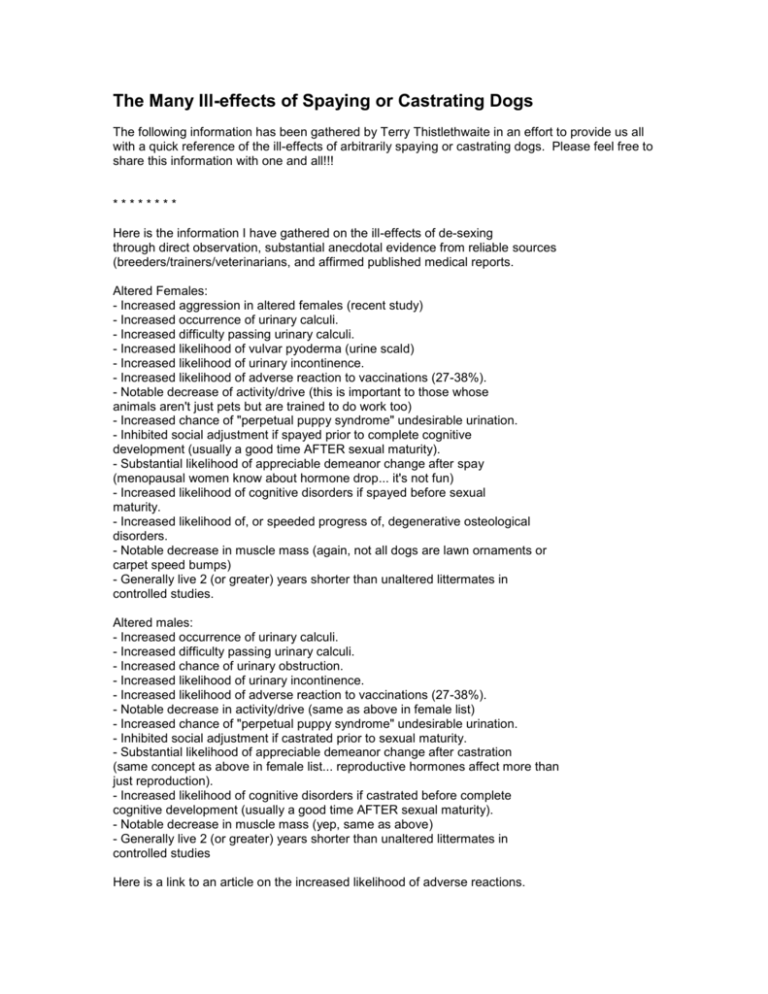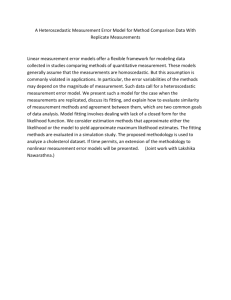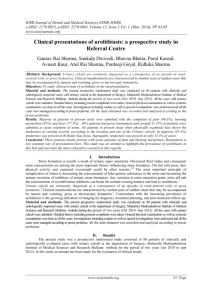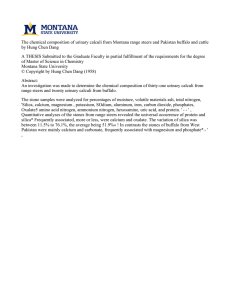
The Many Ill-effects of Spaying or Castrating Dogs
The following information has been gathered by Terry Thistlethwaite in an effort to provide us all
with a quick reference of the ill-effects of arbitrarily spaying or castrating dogs. Please feel free to
share this information with one and all!!!
********
Here is the information I have gathered on the ill-effects of de-sexing
through direct observation, substantial anecdotal evidence from reliable sources
(breeders/trainers/veterinarians, and affirmed published medical reports.
Altered Females:
- Increased aggression in altered females (recent study)
- Increased occurrence of urinary calculi.
- Increased difficulty passing urinary calculi.
- Increased likelihood of vulvar pyoderma (urine scald)
- Increased likelihood of urinary incontinence.
- Increased likelihood of adverse reaction to vaccinations (27-38%).
- Notable decrease of activity/drive (this is important to those whose
animals aren't just pets but are trained to do work too)
- Increased chance of "perpetual puppy syndrome" undesirable urination.
- Inhibited social adjustment if spayed prior to complete cognitive
development (usually a good time AFTER sexual maturity).
- Substantial likelihood of appreciable demeanor change after spay
(menopausal women know about hormone drop... it's not fun)
- Increased likelihood of cognitive disorders if spayed before sexual
maturity.
- Increased likelihood of, or speeded progress of, degenerative osteological
disorders.
- Notable decrease in muscle mass (again, not all dogs are lawn ornaments or
carpet speed bumps)
- Generally live 2 (or greater) years shorter than unaltered littermates in
controlled studies.
Altered males:
- Increased occurrence of urinary calculi.
- Increased difficulty passing urinary calculi.
- Increased chance of urinary obstruction.
- Increased likelihood of urinary incontinence.
- Increased likelihood of adverse reaction to vaccinations (27-38%).
- Notable decrease in activity/drive (same as above in female list)
- Increased chance of "perpetual puppy syndrome" undesirable urination.
- Inhibited social adjustment if castrated prior to sexual maturity.
- Substantial likelihood of appreciable demeanor change after castration
(same concept as above in female list... reproductive hormones affect more than
just reproduction).
- Increased likelihood of cognitive disorders if castrated before complete
cognitive development (usually a good time AFTER sexual maturity).
- Notable decrease in muscle mass (yep, same as above)
- Generally live 2 (or greater) years shorter than unaltered littermates in
controlled studies
Here is a link to an article on the increased likelihood of adverse reactions.
_http://avmajournals.avma.org/doi/abs/10.2460/javma.2005.227.1102?prevSearch=a
llfield%3A%28Adverse+Events+Diagnosed+Within+3+Days%29_
(http://avmajournals.avma.org/doi/abs/10.2460/javma.2005.227.1102?prevSearch=all\
field:(Adverse+Event
s+Diagnosed+Within+3+Days))
After reading this, do you feel as though you've been told the whole story
about things by your veterinarian? I don't know about you, but to me it
certainly doesn't sound as if altered animals are healthier than their
brethren who were left as Nature started them out to be. But that's just me.
********










